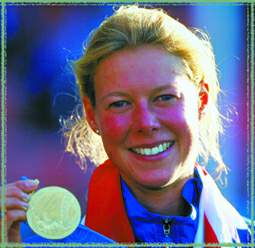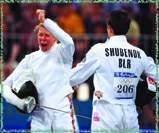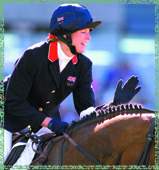עיתונאיות ועיתונאים, הירשמו כאן להודעות לעיתונות שלנו
הירשמו לניוזלטר החודשי שלנו:

Great Britain's Stephanie Cook snatched a dramatic gold at the Sydney Olympics - pistol shooting, fencing, swimming, riding, and finally running her way to victory in the first ever Olympic women's pentathlon.
But she's not only an all-round athlete. The 28-year-old started training full-time only a year earlier and then won Olympic selection at the World Cup Competition in Mexico. To do so, she had to put her career, as a physician, on hold.
It was at Oxford that Cook picked up her passion for the pentathlon - a contest demanding the utmost in both endurance and technical versatility. Treading a most unusual how-to-survive-medical-school path, her days were spent mastering the nuts and bolts of medicine while picking up the ancient art of fencing, learning how to shoot at a target with a 0.177 air pistol, and somehow squeezing in cross-country running, swimming, and horseback riding, a childhood favorite. "I've always tried to cram a lot into life," says Cook. Her manner is down-to-earth and her enthusiasm is catching. "I may have taken what started as a hobby to an extreme, but at the end of the day, I still enjoy the sport." Raised in Ayr, Scotland, one of the experiences Cook "crammed" in - at the age of 18 - was a summer here in Rehovot, at Weizmann's Bessie Lawrence International Summer Science Institute. She credits this experience with broadening her horizons in terms of the great variety of medical research. It also enhanced a previous interest in surgery, sparked during high school, when she met Professor Sir Roy Calne, a leading liver-transplant surgeon. (Calne, of Addenbrooke Hospital, Cambridge, paved the way to successful kidney, heart, and liver transplants following his discovery that a new drug, azathioprine, could stop graft rejection.) While at the Weizmann Institute, Cook took part in bone marrow transplantation research conducted by Prof. Yair Reisner's team in the Immunology Department.
But it wasn't all lab-work and no play. In what she describes as a fantastic summer, Cook also remembers climbing desert wadis, learning outdoor survival skills, and cooling off in the Golan waterfalls, adding that she's still in contact with some of her fellow Weizmann students.
How does Stephanie Cook, the doctor, meet up with Stephanie Cook, the world-class athlete? "Obviously, when you're training at this level you really push your body to the extreme, says Cook. "And in fact it's an interesting experience understanding the anatomy and physiology and therefore what the body is actually going through."

One field that Cook claims was invaluable to her success is sports psychology. "It's incredibly important to believe in one's ability, and to be able to turn around a negative situation to something positive," she stresses. This belief, combined with running - her forte and her greatest love - is what won the day at Sydney. Cook started the 3,000-meter run in 8th place, assigned according to her accumulated points from the first four events. Undeterred, she tore off in pursuit of the leaders, Britain's Kate Allenby and America's Emily deRiel. The crowd's roar swelled as she narrowed the gap with each passing second, until she flew past deRiel 300 meters from the finish line, claiming gold.
What comes next? Despite the exciting career opportunities awaiting her as an athlete, Cook will soon lay down her sword and sneakers - in exchange for a scalpel. "It took me a while to decide what I truly wanted rather than what opportunities were out there.

Meanwhile, those of us here at the Weizmann Institute might be intrigued by the thought that our sports facilities served as a training ground for a future Olympic gold medallist.